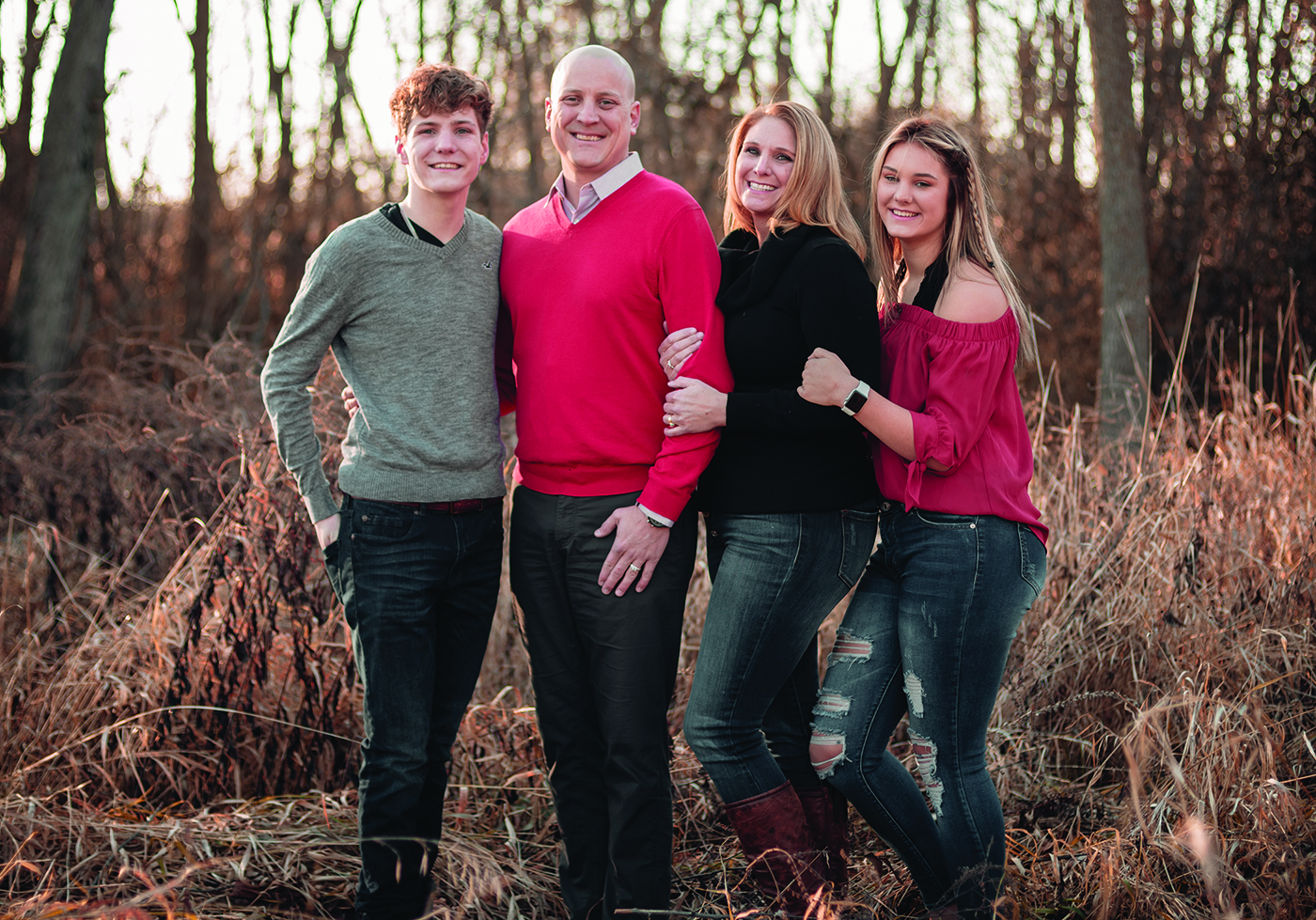
Three-fourths of the Fosler family, pictured above, caught COVID-19 but Wyatt, Paul’s son, did not. FHN hospitalist Clarence Parks, MD reminded Paul that this is a novel – meaning new – coronavirus, and experts don’t yet know everything about how it spreads and how it impacts different populations.
He didn’t know he was exposed to COVID-19, so when Paul Fosler felt tired and “off” in late October, he dismissed it as a lack of rest and generally “too much to do.”
For the next few days, his symptoms remained the same. By day four of his fatigue, Paul’s wife Kristine urged him to get tested for COVID-19 and got a referral to FHN’s Acute Respiratory Clinic. This new facility, located on the lower east side of FHN Specialty Care – Harlem Avenue in Freeport, is set up to help stop the spread of COVID-19 and other respiratory diseases while accelerating their diagnosis and treatment.
Paul’s test came back positive. After fighting manageable symptoms at home for seven days, a bad cough and difficulty breathing set in. At age 42 with no underlying health conditions, he was somewhat shocked his symptoms got so severe. “I got blood work and an x-ray, and Dr. Parks said my left lung looked a bit cloudy. He allowed me to head back home to recuperate, hoping I would get better with a little rest, a battery of vitamins, and medications for my symptoms. I was counting on not being down for too long, which seemed to be the case with many COVID patients in my age group.”
Struggling to Inhale
Unfortunately for Paul, a quick recovery was not in the cards. “I don’t usually get very sick, but with each passing day, my symptoms became more miserable,” he explains. “I felt horrible. I had a heavy cough, chills, and fever. My breathing became more labored, and I was really struggling to inhale. When I stood up, I felt heavy and weak. My wife checked my blood oxygen rate with a home oximeter, and it was in the 80s – way too low. She took me to the hospital.” When Paul arrived at FHN Memorial Hospital, Clarence Parks, MD, an FHN hospitalist, ordered a CT scan to evaluate his condition. “He said the results were telling: My lungs looked worse than before and I likely had COVID-related pneumonia.”
Paul was sent to FHN’s COVID Intensive Care Unit (ICU), where he received an intravenous dose of convalescent plasma therapy, which contains antibodies from patients who have recovered from the virus along with prescription remdesivir and several other medications.
“I was covered in body sensors to constantly monitor my vitals, and my liver count escalated to unacceptable levels, which can be a side effect of the remdesivir. I didn’t get to take the last dose of it,” he says.
Fighting For Each Patient
Paul’s careful monitoring was a priority of the FHN ICU staff, as it is for each patient. “The nurses were so nice and helpful, despite how hectic it was in the ICU; they were swamped,” he observes. “Sarah and Kyla were excellent and Dr. Parks was wonderful – he came to see me every day and was outstanding with follow-up. They were a tremendous team.”
After Paul’s condition started to improve, he was moved to the telemetry department, which is currently used for COVID-positive patients. “Nurses from other departments came up to assist, which really made a difference,” he elaborates. “RNs Krista and Jen were fantastic, and CNAs Isabelle and Colton were great, day and night. It took a couple more days, but then I started to feel much better.
“I was really missing my family, especially knowing my wife and daughter had also tested positive and were dealing with minor symptoms of their own. I was thankful they didn’t get too sick. My son Wyatt lucked out. He never got it. It is so bizarre. Dr. Parks explained that there is a lot we still need to learn about this specific type of coronavirus, and many questions remain.” Dr. Parks and FHN’s other providers have treated hundreds of COVID patients at FHN.
Going Home Grateful
Ultimately, Paul was sent home with oxygen support, which he relied upon for another week. He has had one follow-up appointment with his family medicine provider, Tamisha Bonvillain, FNP-BC, IBCLC, who analyzed his bloodwork and breathing. All went well. He’ll have more follow-up visits, since some COVID-19 patients may deal with long-term effects. In the meantime, Paul is thankful to feel “back to normal.” He shares, "I have lived in Freeport my whole life, and I could not have been happier with FHN. It was a scary experience, but the people and the processes made it bearable. I am so grateful for everybody who helped me get better. From my first day at Acute Respiratory Care to my time in the hospital to my aftercare, everyone has been great – professional, compassionate, and just plain nice."